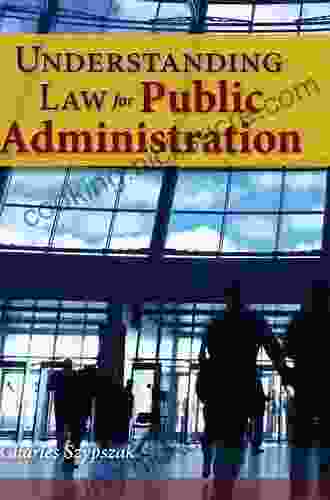Understanding Law for Public Administration: A Comprehensive Guide

4.4 out of 5
| Language | : | English |
| File size | : | 2082 KB |
| Text-to-Speech | : | Enabled |
| Screen Reader | : | Supported |
| Enhanced typesetting | : | Enabled |
| Word Wise | : | Enabled |
| Print length | : | 362 pages |
Law plays a fundamental role in public administration, providing the framework within which public sector entities operate and make decisions. Understanding the legal landscape is crucial for public administrators to effectively carry out their responsibilities and ensure compliance with legal requirements. This article aims to provide a comprehensive to law for public administration, exploring key legal concepts, the administrative process, and the ways in which law shapes public sector decision-making.
Key Legal Concepts
Public administrators must have a solid understanding of basic legal concepts that form the foundation of public administration law. These include:
- Administrative Law: The body of law that governs the operations of government agencies, including their rulemaking, decision-making, and enforcement powers.
- Constitutional Law: The supreme law of the land, which establishes the structure and powers of government, including the separation of powers and the rights of citizens.
- Statutory Law: Laws enacted by legislative bodies, which provide specific rules and regulations governing various aspects of public administration.
- Common Law: Laws developed by judges over time through court decisions, which establish legal precedents that guide future decisions.
- Tort Law: The body of law that governs civil wrongs, providing remedies for individuals who have suffered harm due to the actions or negligence of others.
The Administrative Process
The administrative process refers to the procedures by which government agencies make decisions and implement policies. Key stages include:
- Rulemaking: The process by which agencies develop and adopt regulations, which have the force of law.
- Adjudication: The process by which agencies resolve disputes and make decisions affecting individual rights or interests.
- Enforcement: The process by which agencies ensure compliance with laws and regulations, often involving penalties or sanctions.
The Role of Law in Public Sector Decision-Making
Law provides the framework for public sector decision-making, ensuring that decisions are made fairly, transparently, and in accordance with the public interest. Key considerations include:
- Legal Authority: Public administrators must have the legal authority to make decisions, which is typically granted by statutes or regulations.
- Compliance with Legal Requirements: Decisions must comply with all applicable laws and regulations, ensuring that agencies act within their powers and protect the rights of citizens.
- Due Process: In certain situations, individuals are entitled to procedural safeguards, such as notice, a fair hearing, and the right to appeal, before government actions can be taken against them.
- Ethics and Discretion: While law provides a framework for decision-making, public administrators often have discretion within legal bounds. Ethical considerations should guide the exercise of discretion.
Specific Legal Frameworks
In addition to the general principles of law discussed above, public administrators must be familiar with specific legal frameworks that apply to particular areas of public administration. These include:
- Government Contracts Law: Regulates the procurement of goods and services by government agencies.
- Employment Law: Governs the relationship between public employers and employees, including hiring, firing, and labor relations.
- Environmental Law: Protects the environment and regulates the pollution of air, water, and land.
- Tax Law: Governs the collection and use of taxes to fund government operations.
- Social Welfare Law: Provides benefits and services to individuals and families in need.
Understanding law is essential for public administrators to effectively carry out their responsibilities and make informed decisions. This article has provided a comprehensive overview of key legal concepts, the administrative process, and the role of law in public sector decision-making. By staying abreast of legal developments and applying legal principles in their work, public administrators can ensure compliance, protect the rights of citizens, and uphold the public interest.
4.4 out of 5
| Language | : | English |
| File size | : | 2082 KB |
| Text-to-Speech | : | Enabled |
| Screen Reader | : | Supported |
| Enhanced typesetting | : | Enabled |
| Word Wise | : | Enabled |
| Print length | : | 362 pages |
Do you want to contribute by writing guest posts on this blog?
Please contact us and send us a resume of previous articles that you have written.
 Fiction
Fiction Non Fiction
Non Fiction Romance
Romance Mystery
Mystery Thriller
Thriller SciFi
SciFi Fantasy
Fantasy Horror
Horror Biography
Biography Selfhelp
Selfhelp Business
Business History
History Classics
Classics Poetry
Poetry Childrens
Childrens Young Adult
Young Adult Educational
Educational Cooking
Cooking Travel
Travel Lifestyle
Lifestyle Spirituality
Spirituality Health
Health Fitness
Fitness Technology
Technology Science
Science Arts
Arts Crafts
Crafts DIY
DIY Gardening
Gardening Petcare
Petcare Kerri Andrews
Kerri Andrews Rich Luhr
Rich Luhr John Bantin
John Bantin S Fatou
S Fatou Ken Gullette
Ken Gullette Joe Wells
Joe Wells Luke Hohmann
Luke Hohmann Jason Louv
Jason Louv Laurie Seale
Laurie Seale Pete Pfitzinger
Pete Pfitzinger Kathleen Dean Moore
Kathleen Dean Moore James Branch Cabell
James Branch Cabell Brian C Muraresku
Brian C Muraresku Gillian Tett
Gillian Tett Bernard A Chavis
Bernard A Chavis Becky Lomax
Becky Lomax Robert H Miller
Robert H Miller Rashid Khalidi
Rashid Khalidi Necoco
Necoco Patsy M Lightbown
Patsy M Lightbown Arlo Adams
Arlo Adams Bobby Orr
Bobby Orr Melissa Reynolds
Melissa Reynolds Walter Greiner
Walter Greiner Robin Mamlet
Robin Mamlet Rob Summers
Rob Summers Thomas S Kuhn
Thomas S Kuhn Michael T Nygard
Michael T Nygard Ola Ola
Ola Ola Stephanie Cacioppo
Stephanie Cacioppo Linda Eyre
Linda Eyre Roberto Pedreira
Roberto Pedreira Gabby Rivera
Gabby Rivera Janet Wolanin Alexander
Janet Wolanin Alexander Jenna Miscavige Hill
Jenna Miscavige Hill W J Hendry
W J Hendry James Mallory
James Mallory Mary Keith Piasecki
Mary Keith Piasecki Gerald A Moore Sr
Gerald A Moore Sr James R Morrow Jr
James R Morrow Jr Nancy Mcwilliams
Nancy Mcwilliams Christos Lynteris
Christos Lynteris Brenda Reed Pilcher
Brenda Reed Pilcher Malinda Lo
Malinda Lo J David Logan
J David Logan Kenneth S Shultz
Kenneth S Shultz Mason Deaver
Mason Deaver Wildlife Trusts
Wildlife Trusts Riley Black
Riley Black Jim Curran
Jim Curran Nick Marshall
Nick Marshall Jefferson Hawkins
Jefferson Hawkins Julie Powers
Julie Powers Dayton O Hyde
Dayton O Hyde Dana Mccullough
Dana Mccullough Arous Brocken
Arous Brocken Paul Abell
Paul Abell Andrew Beyer
Andrew Beyer Brandon Mull
Brandon Mull Kathryne Kennedy
Kathryne Kennedy Steven Poses
Steven Poses George Mahood
George Mahood Marcus A Pfeiffer
Marcus A Pfeiffer Jordan Romero
Jordan Romero Vertamae Smart Grosvenor
Vertamae Smart Grosvenor Joe Posnanski
Joe Posnanski Vin T Sparano
Vin T Sparano Michael Judge
Michael Judge Stuart L Kaplan M D
Stuart L Kaplan M D Joseph Bruchac
Joseph Bruchac Terence Callery
Terence Callery James Willstrop
James Willstrop Susan Williams White
Susan Williams White Kristin Briney
Kristin Briney Baz Thompson
Baz Thompson Frances Evesham
Frances Evesham Melissa Caughey
Melissa Caughey Mary Jane Sterling
Mary Jane Sterling M D Johnson
M D Johnson Giada De Laurentiis
Giada De Laurentiis Rachel Meltzer Warren
Rachel Meltzer Warren Richard Bolstad
Richard Bolstad Hampton Sides
Hampton Sides Roger Atwood
Roger Atwood Jeremy Freese
Jeremy Freese Sarah Castille
Sarah Castille Prasad Raju V V N R Pathapati
Prasad Raju V V N R Pathapati Greg Presto
Greg Presto Gaurav Suri
Gaurav Suri Paul Kalas
Paul Kalas Nic Oatridge
Nic Oatridge Richard Munson
Richard Munson Victoria Ortiz
Victoria Ortiz Tom Siegfried
Tom Siegfried Laurie Ann Thompson
Laurie Ann Thompson Kelly Oliver
Kelly Oliver Anna Holmwood
Anna Holmwood Catherine Montgomery
Catherine Montgomery Rizwan Virk
Rizwan Virk Sameera Khan Rd Pa C
Sameera Khan Rd Pa C Tony Herman
Tony Herman Pliny The Elder
Pliny The Elder Peter Mcbride
Peter Mcbride Stephan J Guyenet
Stephan J Guyenet Kyle Keegan
Kyle Keegan David Abram
David Abram Paulette F C Steeves
Paulette F C Steeves Steven H Weintraub
Steven H Weintraub Jay Annelli
Jay Annelli Joelle Charbonneau
Joelle Charbonneau Victoria Schwab
Victoria Schwab Neil Oliver
Neil Oliver Ivan Pastine
Ivan Pastine Jed Z Buchwald
Jed Z Buchwald Jay Greeson
Jay Greeson Course Hero
Course Hero Namina Forna
Namina Forna Rick Westhead
Rick Westhead Samantha Rodman
Samantha Rodman Francesca Zappia
Francesca Zappia Arianna Astuni
Arianna Astuni Martin Rooney
Martin Rooney Tom Lodziak
Tom Lodziak Sean Pidgeon
Sean Pidgeon Brock Eide
Brock Eide 18th Edition Kindle Edition
18th Edition Kindle Edition Galen Wolf
Galen Wolf George Hospodar
George Hospodar Minal Hajratwala
Minal Hajratwala Jonathan Cummings
Jonathan Cummings James Fox
James Fox Jenn Brandt
Jenn Brandt Marta Obiols Llistar
Marta Obiols Llistar Gary Thomas
Gary Thomas Tillie Walden
Tillie Walden Rajani Katta
Rajani Katta Sid Thatte
Sid Thatte Ruby Walker
Ruby Walker William Ritter
William Ritter Jen Calonita
Jen Calonita Ian Tattersall
Ian Tattersall Will Thornton
Will Thornton Wendy Heard
Wendy Heard Matt Fulks
Matt Fulks Deaver Brown
Deaver Brown Craig Custance
Craig Custance Andrea Gonzales
Andrea Gonzales Steven Johnson
Steven Johnson Pietro Matracchi
Pietro Matracchi Richard Heinberg
Richard Heinberg Jennifer Blair
Jennifer Blair Donald S Murray
Donald S Murray Ryan Pellett
Ryan Pellett John Gilbert
John Gilbert Raymond E Feist
Raymond E Feist Ewen Levick
Ewen Levick Laura Lincoln Maitland
Laura Lincoln Maitland Leslie Vedder
Leslie Vedder Daniel Humm
Daniel Humm Andy Bull
Andy Bull Margaret Thorsborne
Margaret Thorsborne Keith Sutton
Keith Sutton L Michele Issel
L Michele Issel Rachael Chapman
Rachael Chapman Clayton Everline
Clayton Everline Lisa Bond
Lisa Bond Kelly Tyler Lewis
Kelly Tyler Lewis Leslie Sokol
Leslie Sokol Anne Holler
Anne Holler Usa Pickleball Association
Usa Pickleball Association Richard P Feynman
Richard P Feynman Linda Anne Silvestri
Linda Anne Silvestri Andrea Flores
Andrea Flores Kevin Cook
Kevin Cook Nancy Mather
Nancy Mather Rolf Potts
Rolf Potts Jack Hunnicutt
Jack Hunnicutt Dylan Norton
Dylan Norton Robin Satty
Robin Satty Jeff Davis
Jeff Davis Andrea Komlosy
Andrea Komlosy Marcus Felson
Marcus Felson Barbara Merry
Barbara Merry George Christian Pappas
George Christian Pappas Denise Riebe
Denise Riebe Rita Jablonski
Rita Jablonski Seth Reichelson
Seth Reichelson Chiara Marletto
Chiara Marletto Adam Mansbach
Adam Mansbach Bruce D Perry
Bruce D Perry Andrea Bemis
Andrea Bemis Bisco Hatori
Bisco Hatori V E Schwab
V E Schwab Bernard Craw
Bernard Craw Ricky Moore
Ricky Moore E K Johnston
E K Johnston Tim Ryan
Tim Ryan David Borgenicht
David Borgenicht Leigh Bardugo
Leigh Bardugo Michio Kaku
Michio Kaku Anne Bogel
Anne Bogel Gemma Rogers
Gemma Rogers Peter Boardman
Peter Boardman Richard Bellman
Richard Bellman Roland Martin
Roland Martin Katharine B Soper
Katharine B Soper Gregory Curtis
Gregory Curtis Garcilaso De La Vega
Garcilaso De La Vega Robert Hamill
Robert Hamill James E Wisher
James E Wisher Harriet Brown
Harriet Brown David Montgomery
David Montgomery Christina Kim
Christina Kim Elizabeth S Meckes
Elizabeth S Meckes Andrew Duncan
Andrew Duncan Joey Miller Msw Lcsw
Joey Miller Msw Lcsw Luigi Gabriele Conti
Luigi Gabriele Conti Andrew St Pierre White
Andrew St Pierre White Jack Purdum
Jack Purdum Robyn Sheldon
Robyn Sheldon Mike Davenport
Mike Davenport Kindra Gordon
Kindra Gordon Ann Gadzikowski
Ann Gadzikowski Andrej Spec
Andrej Spec Dani Jacobs
Dani Jacobs Sheila Jasanoff
Sheila Jasanoff Kailin Gow
Kailin Gow David Alloway
David Alloway Robert Bacal
Robert Bacal Caren Van Slyke
Caren Van Slyke Elizabeth Clor
Elizabeth Clor Joseph Luzzi
Joseph Luzzi Serena Valentino
Serena Valentino Ronald D Davis
Ronald D Davis Gwendolyn Griffith Lieuallen
Gwendolyn Griffith Lieuallen Bruce Mcnall
Bruce Mcnall William F Sensakovic
William F Sensakovic Joe Cavallaro
Joe Cavallaro Kylie Lee Baker
Kylie Lee Baker Paco Underhill
Paco Underhill Kjartan Poskitt
Kjartan Poskitt Mark Mcconville
Mark Mcconville Rupert Sheldrake
Rupert Sheldrake Steven J Matthiesen
Steven J Matthiesen Galit Shmueli
Galit Shmueli Bettina Bonifatti
Bettina Bonifatti Andrew Greiner
Andrew Greiner Thomas Watson
Thomas Watson Timothy Johnson
Timothy Johnson Hasok Chang
Hasok Chang Jessica Mccrory Calarco
Jessica Mccrory Calarco Kristine Papin Morris
Kristine Papin Morris Stan Tekiela
Stan Tekiela Jason Zemcik
Jason Zemcik Laird Hamilton
Laird Hamilton Cliff Wilson
Cliff Wilson Lars Muhl
Lars Muhl Michele Leathers
Michele Leathers Jason Welker
Jason Welker Julie Miller
Julie Miller Antonio Iturbe
Antonio Iturbe Mira Kirshenbaum
Mira Kirshenbaum Ben Doughty
Ben Doughty Thomas Meyer
Thomas Meyer Sara Manning Peskin
Sara Manning Peskin Andrea Curtis
Andrea Curtis Trish Allison
Trish Allison Patrick Mouratoglou
Patrick Mouratoglou Noel Janis Norton
Noel Janis Norton Andre Watson
Andre Watson Peter May
Peter May Rachel Hawkins
Rachel Hawkins Lucia Ashta
Lucia Ashta Isabel Sterling
Isabel Sterling Bonita Norris
Bonita Norris Luke Rosiak
Luke Rosiak Robert Sky Allen Ph D
Robert Sky Allen Ph D Steve Caplin
Steve Caplin Kristen Thone
Kristen Thone Sue Fierston
Sue Fierston Sudhir Shirwadkar
Sudhir Shirwadkar Andrew Blauner
Andrew Blauner Karen Robson
Karen Robson C L Werner
C L Werner George E P Box
George E P Box Mike Cyra
Mike Cyra Lena Shev
Lena Shev Leisy J Abrego
Leisy J Abrego Department Of Defense
Department Of Defense Daniel Shiffman
Daniel Shiffman Loren Pope
Loren Pope Elizabeth Marshall Thomas
Elizabeth Marshall Thomas Victoria Allman
Victoria Allman Mandy Baggot
Mandy Baggot Romney Steele
Romney Steele Sorin Dumitrascu
Sorin Dumitrascu Shaun Assael
Shaun Assael Jonathan Clements
Jonathan Clements Andrea Cataldo
Andrea Cataldo James Dodson
James Dodson Future Publishing
Future Publishing Christopher Sommer
Christopher Sommer Claire Maxted
Claire Maxted Carrie Ryan
Carrie Ryan Tod Schimelpfenig
Tod Schimelpfenig Zak Mt Standridge
Zak Mt Standridge Peter Scazzero
Peter Scazzero James Lyons Weiler
James Lyons Weiler Tom Lecompte
Tom Lecompte Dr Gabriel Peter Salgo
Dr Gabriel Peter Salgo Lauren Daniels
Lauren Daniels Milo Stewart
Milo Stewart Christine Balaz
Christine Balaz Nathaniel Philbrick
Nathaniel Philbrick Eugene Raikhel
Eugene Raikhel John Ramirez
John Ramirez Sarah Outen
Sarah Outen Steve Scott
Steve Scott Geoffrey Wolff
Geoffrey Wolff Dorothy Pang
Dorothy Pang Rachel Atwood
Rachel Atwood Terry Ann Williams Richard
Terry Ann Williams Richard Michael S Malone
Michael S Malone Erich Neumann
Erich Neumann Steve Bisheff
Steve Bisheff Lori Shandle Fox
Lori Shandle Fox C L Mississippi Morgan
C L Mississippi Morgan Jaak Panksepp
Jaak Panksepp Bhavesh Mamtani
Bhavesh Mamtani Hayley Campbell
Hayley Campbell Shane Ryan
Shane Ryan Laura Domino
Laura Domino Suzy Ashworth
Suzy Ashworth Candace Clark Trinchieri
Candace Clark Trinchieri Ronald W Doerfler
Ronald W Doerfler Lilith Starr
Lilith Starr Andrea Wachter
Andrea Wachter Big Daddy Ozone
Big Daddy Ozone Ken Blanchard
Ken Blanchard Ronald J Harshbarger
Ronald J Harshbarger Susanna Kearsley
Susanna Kearsley Josh Tabor
Josh Tabor Meiso
Meiso James Geary
James Geary Annette Curtis Klause
Annette Curtis Klause Brad Schoenfeld
Brad Schoenfeld Steven Arms
Steven Arms Bernard Moitessier
Bernard Moitessier Richard Maury
Richard Maury Kelsie Stelting
Kelsie Stelting Rick Heard
Rick Heard Michael Hermann
Michael Hermann Bob Mayer
Bob Mayer Donna Bollinger
Donna Bollinger Robert B Yonaitis
Robert B Yonaitis Dot Edu
Dot Edu Nick Peters
Nick Peters Andrea Cremer
Andrea Cremer Steve Sheinkin
Steve Sheinkin Joseph Terry
Joseph Terry Bruce Bowlen
Bruce Bowlen Nancy B Rapoport
Nancy B Rapoport Michael Anderle
Michael Anderle Anne Marie Meyer
Anne Marie Meyer Thomas Berger
Thomas Berger Peter David
Peter David Raymond Coppinger
Raymond Coppinger Gabrielle Coleman
Gabrielle Coleman Jim Apfelbaum
Jim Apfelbaum Jennifer Anne Davis
Jennifer Anne Davis A J Carlisle
A J Carlisle Matt Richtel
Matt Richtel Cathal Armstrong
Cathal Armstrong Charles H Hapgood
Charles H Hapgood Andrew Gelman
Andrew Gelman Pat Wray
Pat Wray Andrea Hudy
Andrea Hudy Andrew Doughty
Andrew Doughty Andrew Goliszek
Andrew Goliszek Karen Tranberg Hansen
Karen Tranberg Hansen Tim Wharnsby
Tim Wharnsby Wolfgang Hohlbein
Wolfgang Hohlbein Buster Benson
Buster Benson Nikola Tesla
Nikola Tesla Jimmy Elliott
Jimmy Elliott Sandra Glosser
Sandra Glosser Robin Ha
Robin Ha Jim Shea
Jim Shea Joseph Ledoux
Joseph Ledoux Oliver Perkins
Oliver Perkins Tracy Townsend
Tracy Townsend Ben Orlin
Ben Orlin Rashers Tierney
Rashers Tierney Leslie Morgan Steiner
Leslie Morgan Steiner Paul Rooyackers
Paul Rooyackers Hugh Raffles
Hugh Raffles Emily Henry
Emily Henry Chris Mcmullen
Chris Mcmullen James Rebanks
James Rebanks Brian Azzarello
Brian Azzarello Christine Heppermann
Christine Heppermann Chris Lilly
Chris Lilly D Harvey
D Harvey Eric Engle
Eric Engle Lynne L Finch
Lynne L Finch Catie Czora
Catie Czora Jakub Marian
Jakub Marian Sunny Anderson
Sunny Anderson Jon Gillespie Brown
Jon Gillespie Brown Stephen Chbosky
Stephen Chbosky Erica Hoke
Erica Hoke David Scott
David Scott Mark Hume
Mark Hume Mark M Meerschaert
Mark M Meerschaert Steven M Fiser
Steven M Fiser Aldous Huxley
Aldous Huxley Charles Szypszak
Charles Szypszak Connie J Wells
Connie J Wells Morihei Ueshiba
Morihei Ueshiba James A Middleton
James A Middleton Simon Garfield
Simon Garfield Ian O Connor
Ian O Connor Patrick W Galbraith
Patrick W Galbraith Marta Szabo
Marta Szabo April Vahle Hamel
April Vahle Hamel Ed Willes
Ed Willes Patrick Hatt
Patrick Hatt Tamara Ireland Stone
Tamara Ireland Stone Jenny Mackay
Jenny Mackay Stephen Wiggins
Stephen Wiggins Andrea Olson
Andrea Olson H Spencer Lewis
H Spencer Lewis Charlotte Elkins
Charlotte Elkins Ralph Zuranski
Ralph Zuranski Kiersten White
Kiersten White Robert Jay Lifton
Robert Jay Lifton Rob Taylor
Rob Taylor Frans De Waal
Frans De Waal Marvin L Bittinger
Marvin L Bittinger C B Lee
C B Lee Bridget Portmann
Bridget Portmann William Gerin
William Gerin Jacqueline Edmondson
Jacqueline Edmondson Greg Ruth
Greg Ruth Andrew Brown
Andrew Brown Jamie Ivey
Jamie Ivey Kirby Arnold
Kirby Arnold Benedict Carey
Benedict Carey Mara Rockliff
Mara Rockliff Stacey Little
Stacey Little Bill O Neill
Bill O Neill Florent Buisson
Florent Buisson Daniel P Murphy
Daniel P Murphy Carmen Micsa
Carmen Micsa Metin Bektas
Metin Bektas Andrew Feinberg
Andrew Feinberg J E Lendon
J E Lendon James Turnbull
James Turnbull Jennifer L Armentrout
Jennifer L Armentrout Marissa Meyer
Marissa Meyer Elizabeth S Trafalgar
Elizabeth S Trafalgar David W Brown
David W Brown Robin Hobb
Robin Hobb Sandy Stott
Sandy Stott Maria Konnikova
Maria Konnikova Mike Gauthier
Mike Gauthier Steve Anthony Tallon
Steve Anthony Tallon Guillermo Ferrara
Guillermo Ferrara Doug Swisher
Doug Swisher Lonely Planet
Lonely Planet Lundy Bancroft
Lundy Bancroft Mara Vorhees
Mara Vorhees Richard N Aufmann
Richard N Aufmann John Morton
John Morton Paul Stamets
Paul Stamets Chris Salisbury
Chris Salisbury Christian Keur
Christian Keur 24th Edition Kindle Edition
24th Edition Kindle Edition Whitney Nelson
Whitney Nelson
Light bulbAdvertise smarter! Our strategic ad space ensures maximum exposure. Reserve your spot today!

 Zadie SmithEssential Considerations for Dyslexia Assessment and Intervention: Empowering...
Zadie SmithEssential Considerations for Dyslexia Assessment and Intervention: Empowering... Keith CoxFollow ·8.4k
Keith CoxFollow ·8.4k J.R.R. TolkienFollow ·11.2k
J.R.R. TolkienFollow ·11.2k Andres CarterFollow ·13k
Andres CarterFollow ·13k Cade SimmonsFollow ·7.2k
Cade SimmonsFollow ·7.2k Devon MitchellFollow ·9.5k
Devon MitchellFollow ·9.5k Randy HayesFollow ·13.7k
Randy HayesFollow ·13.7k Oliver FosterFollow ·7.6k
Oliver FosterFollow ·7.6k Leo MitchellFollow ·11.2k
Leo MitchellFollow ·11.2k

 Demetrius Carter
Demetrius CarterGolf Scrimmages: Realistic Practice Games Under Pressure
Golf scrimmages are...

 Andres Carter
Andres CarterAhsoka Tano: The Force-Wielding Togruta Who Shaped the...
Ahsoka Tano is one of the most...

 Greg Foster
Greg FosterUndeath Ascendant: A Blood-Soaked Literary Odyssey into...
Immerse yourself in a macabre tapestry of...

 Paulo Coelho
Paulo CoelhoHow an English Polymath and French Polyglot Discovered...
The Rosetta Stone is...
4.4 out of 5
| Language | : | English |
| File size | : | 2082 KB |
| Text-to-Speech | : | Enabled |
| Screen Reader | : | Supported |
| Enhanced typesetting | : | Enabled |
| Word Wise | : | Enabled |
| Print length | : | 362 pages |














